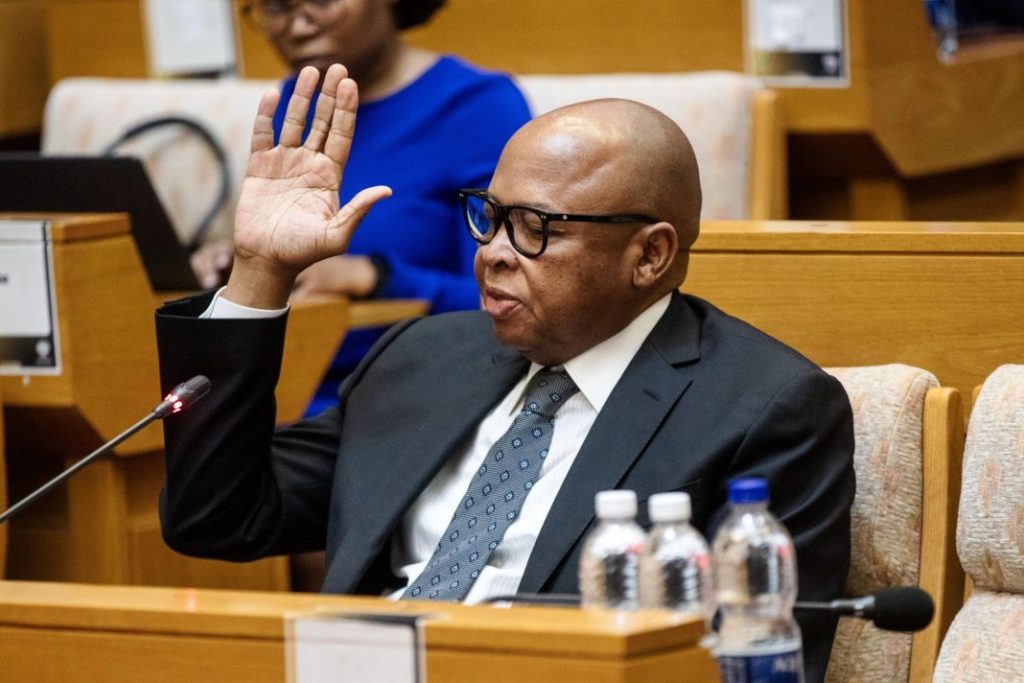Police Deputy Minister Cassel Mathale has told Parliament he first learned about the directive to disband the Political Killings Task Team (PKTT) through social media, and initially assumed the letter — purportedly signed by his superior, Police Minister Senzo Mchunu — was fake.
Testifying before the ad hoc committee investigating KwaZulu-Natal police commissioner Lieutenant-General Nhlanhla Mkhwanazi’s claims, Mathale said he was “surprised” to discover such a major operational decision circulating online before being informed through established government channels.
“We had been interacting all along about everything that is to do with policing, but this specific one, this is how we learnt about it unfortunately,” he said. “I thought this could not be real.”
He said Mchunu only contacted him days later to confirm that he had indeed written the directive calling for the PKTT’s immediate shutdown. Established in 2018, the specialised unit has been central to investigating politically motivated killings in KwaZulu-Natal and beyond.
Practicality questioned
According to Mathale, the instruction raised serious logistical concerns.
“It was saying the PKTT is disbanded with immediate effect and that a plan must be submitted by 20 January and a close-up report by end of the month. It was not practical to do these things,” he said.
He added that he had never received any indication that the task team faced performance or governance issues that could justify its abrupt dismantling.
“Their effectiveness has never been an issue that was questioned. That question was never asked,” he said, noting the team had recorded successful breakthroughs and was considered a key component in combating political assassinations.
While Mathale refrained from challenging Mchunu’s authority, he suggested the decision-making process lacked transparency.
“Whether he is legally correct or wrong I am not able to interpret,” he said.
Committee hears contradictions
Mchunu has defended the decision as part of “normal administrative processes”.
However, committee members argue testimony so far has raised more concerns than clarity.
uMkhonto weSizwe (MK) Party MP Sibonelo Nomvalo said Mathale’s account is the latest in a growing list of testimonies that undermine Mchunu’s claims.
“All of the testimonies — barring that of suspended deputy police commissioner Lieutenant-General Shadrack Sibiya, who lacks credibility — have rebutted the averments made by the suspended minister,” he said.
Nomvalo criticised the lack of consultation within the ministry, pointing out that no senior official has backed Mchunu’s decision or indicated awareness of its rationale.
“There is no one from the department who says, ‘I was consulted in this decision’, and ‘I think it was fair’ or ‘I think it was logical’. Nobody except the minister,” he said.
Governance failures highlighted
Nomvalo further argued that the situation reflects deeper governance failures within SAPS, including the extraordinary delay in formalising performance responsibilities for deputy ministers.
“It is inexcusable that after 12 months, there is no performance plan… It means the suspended minister is just running the show alone, and those two deputy ministers are just sitting there with nothing that compels them to perform a certain task,” he said.
“How are we going to assess their performances when there is no performance plan? So you are going to measure their performance against what?”
He warned that the inquiry continues to reveal “gruesome and shocking” evidence of systemic breakdowns in police ministry oversight and accountability.
“We didn’t know that such terrible things were finding expression,” he said.



